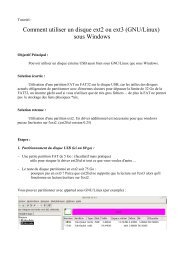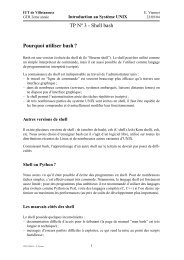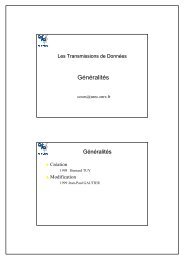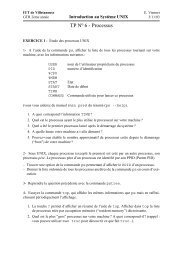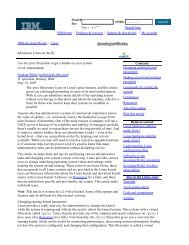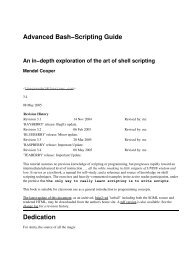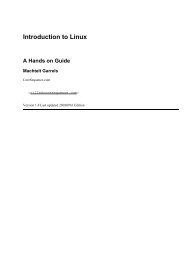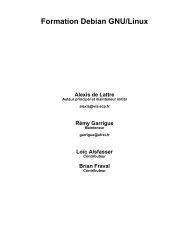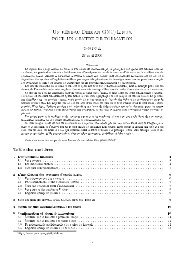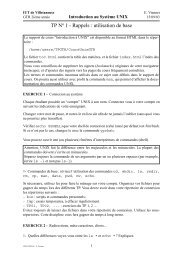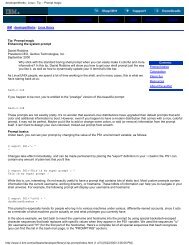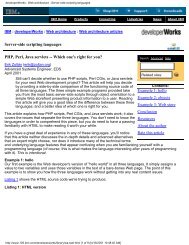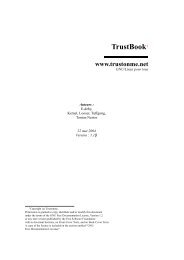Tcl/Tk quick start - Free
Tcl/Tk quick start - Free
Tcl/Tk quick start - Free
You also want an ePaper? Increase the reach of your titles
YUMPU automatically turns print PDFs into web optimized ePapers that Google loves.
Presented by developerWorks, your source for great tutorials<br />
ibm.com/developerWorks<br />
Address: 192.168.1.3#53<br />
Name: orbdesigns.com<br />
Address: 64.81.69.163<br />
% set d [date]<br />
Sun Mar 25 13:51:59 PST 2001<br />
% puts stdout $d<br />
% set d [exec date]<br />
Sun Mar 25 13:52:19 PST 2001<br />
% puts stdout $d<br />
Sun Mar 25 13:52:19 PST 2001<br />
******<br />
% if [catch {open foo r} Chan] {<br />
puts stdout "Sorry, Dave...\n"<br />
}<br />
% gets $Chan<br />
One<br />
% gets $Chan<br />
Two<br />
% eof $Chan<br />
0<br />
% close $Chan<br />
%<br />
Other process commands are exit, which terminates a running <strong>Tcl</strong> script, and pid, which<br />
returns the PID of current (or specified) process, handy for a variety of purposes. <strong>Tcl</strong> does<br />
not incorporate any native process control commands, but you can use the exec command in<br />
concert with PID data to accomplish many tasks.<br />
File manipulation uses the following commands: open, close, gets, puts, read, tell, seek, eof,<br />
and flush. As demonstrated above, the catch command is useful in error checking during file<br />
opening commands. When the program output needs to be printed before a newline<br />
character is encountered, as in a user data prompt, use flush to write the output buffer.<br />
An additional feature (in supported environments) is the ability to open pipelines in the same<br />
manner that you might a file. For instance, after opening a pipeline channel with set Channel<br />
[open "|sort foobar" r], the output of the first gets is going to be "Eight" (alphabetically, out of<br />
file data "One" through "Ten", on 10 separate lines).<br />
Using eval for dynamic scripting<br />
In this example, you can sense the power of the eval command. Under normal<br />
circumstances, the <strong>Tcl</strong> interpreter operates in a one-pass mode: It first parses the input<br />
command line (possibly stretched over several physical lines), performing any substitutions.<br />
Then execution takes place, unless a bad or malformed command is found. eval permits a<br />
second pass (or perhaps more correctly, a pre-pass). Thus a <strong>Tcl</strong> command can be first<br />
dynamically constructed, then parsed and executed.<br />
In the listing below, the input file consists of three lines, each with one arithmetic operation<br />
shown per line. After invoking tclsh, the file is opened read only, and associated with the<br />
$InFile variable. The while loop reads in one line at a time, to $Op. Then a complete <strong>Tcl</strong><br />
command is constructed by pre-pending expr to the $Op variable. This is then expanded,<br />
evaluated, and the result assigned accordingly. Finally, each operation and result is<br />
displayed on stdout.<br />
~/tcltk$ cat input01.txt<br />
<strong>Tcl</strong>/<strong>Tk</strong> <strong>quick</strong> <strong>start</strong> Page 14 of 29



